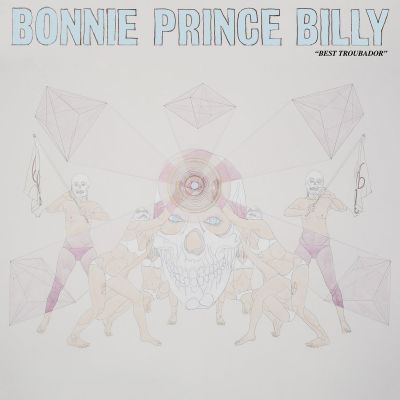Will Oldham’s journey has always been a mysterious one.
And following his recorded output is its own journey, akin to a two-month hike along the Appalachian Trail, an area that Oldham draws from time and again. Chances are, even if you keep pace with almost all of his output, you’ll still be unable to rightfully deduce where he might land next. Some releases are easily identifiable and more easily consumed (Wolfroy Goes to Town); others are direct from the region south of left field (The Bonnie Bells of Oxford).
Oldham has a delightful tendency to throw curveballs into his repertoire without explanation. Couple that with the fact that he, essentially, refuses to adhere to common musical cycles (e.g., press, new album, more press, tour, repeat), and Oldham’s persona as a pioneering artist and trailblazer is set in motion.
Not that Oldham cares.
Critical acclaim is nice, album sales are better, but Oldham's soul gets filled up just by being the titular character of his latest long player: the best troubadour.
Best Troubadour is Oldham’s second album of complete cover songs—the first being his ridiculously amazing and overlooked collaboration with Tortoise, The Brave and the Bold. But where The Brave and the Bold was a grab bag of other artists’ songs, Best Troubadour is Oldham’s paean to the tunes of Merle Haggard, one of the many musicians we lost in the plague of 2016.
Critical acclaim is nice, album sales are better, but Oldham's soul gets filled up just being the titular character of his latest long player: the best troubadour.
I’m glad Oldham picked up Haggard to offer homage; his death was intensely overshadowed by our inability to process the loss of so many artists in a 12-month timeframe. Haggard was a country crooner, an outlaw and an outsider, but also an artist whose longevity and lineage is astounding when placed alongside his contemporaries. Others lined up to pay tribute to him, at a concert at Nashville where everyone from Keith Richards to Lynyrd Skynyrd to Alison Kraus showed up lay down Hag’s songs, but Oldham wasn’t on that list, notably. (Or if he got an invite, he turned it down.) He should have been there, though, because no one has bottled up Merle’s essence better than the man that is Bonnie ‘Prince’ Billy.
It’s difficult to pin down what Oldham does on Best Troubador that makes it so endearing. The formula isn’t radically different from his latest string of BPB records: acoustic guitars, instrumental country accents, traded lead vocals with other bandmates, a mid-fi recorded sound. Oldham always keeps the recording sessions loose and unscripted, which accounts for several moments of genuine affection on the record. From the tape snippet of “What I Hate (Excerpt)” to the hollered instructions to the band on “If I Could Only Fly,” and on into the first-take feel of tracks like “My Old Pal” and “That’s the Way Love Goes,” Best Troubadour is Haggard as only Oldham could hear him.
Despite the front porch feel of a lot of these tracks, some of the best ones—“Leonard," “I’m Always On a Mountain When I Fall,” “The Fugitive”—are examples of Oldham’s musicianship, or, more accurately, the musicians he surrounds himself with. Oldham can corral a Nashville-sized band (for more proof of that, just give a listen to his Sings Greatest Palace Music) and the bigger sounding numbers make for a noble cross somewhere right between Nashville city limits and the hollers of Kentucky.
Haggard’s duality is on display through all 16 songs of Best Troubadour, even though Oldham plays the whole record with heart and patronage. Oldham tamps down his own chameleon shaping to let all sides of Haggard shine bright, and he hits every one of his songs, the early and the later ones, with troves of goodwill. I can’t really think of anybody else who could take on Haggard’s dual singer/songwriter persona—a man who flirted with the angels and the demons of country music, who had no trouble spending Saturday night at a bar, then no hangover could keep him from church on Sunday. Oldham is the vessel for the songs on Best Troubadour, but Haggard is certainly the originator, the muse, and the guiding hand.


